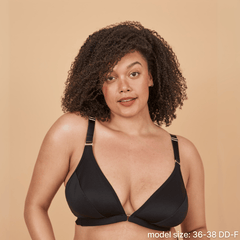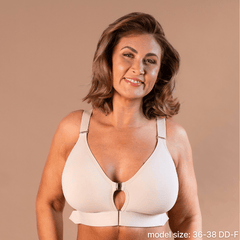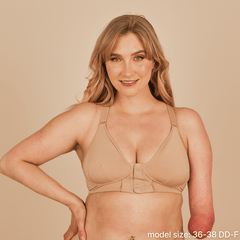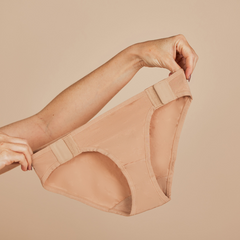
Nicole: Thank you Sarah for talking with me! I really appreciate it. Can you tell us more about yourself?
Sarah: Sure. First of all, I'm a rheumatoid arthritis patient. I've had rheumatoid arthritis for over 20 years and it is a condition where my immune system attacks the joints and soft tissues in my body, which is really painful.
You can hear from my accent, I'm British, and I only came to the US a few years ago. But while I was living back in the UK, I used to work in the corporate world. I worked for really big companies such as KPMG, EY, people like that.
And it turns out that the corporate world and chronic pain conditions don't fit very well. So when I moved over to the US with my husband, I took the opportunity to start my own business.
Nicole: Your business is Grace & Able, which is a lovely name to begin with, but could you tell us more? What inspired you to start it?
Sarah: As someone with arthritis, I was always looking for affordable ways to manage arthritic pain and swelling. Orthopedic bracing and compression products are an effective way to manage arthritic pain, but a lot of the products that are out there are made of pretty cheap materials, so you'll get sweaty hands or sweaty arms if you're wearing them. Or they might be made to look quite bulky, quite ugly, horrible colors, things like that.
I'd been frustrated that I couldn't find any products that I felt comfortable wearing. This came to a head on my wedding day, when I needed to wear a wrist brace to do my first dance. And unfortunately, the only braces I had available were like these beige bulky ones with tons of straps.
Obviously, I wasn't feeling super happy about wearing that with my wedding dress. So I customized a brace and redid it in different fabric and some sparkly things and shared the photo online. And at that point, I realized how many other women were looking for better products.
I also run an online community for women with arthritis called Women with Rheumatoid Disease and I posted my wedding photos there. I got loads of people messaging me saying, “could you make something for me?” And my immediate answer to that was ‘no - I can't’ because I didn't really know what I was doing at all. The idea percolated and I thought about it for a couple of years. And then when I moved to the US, I met a chap called Trevor Petrie who's a hand therapist.
He was also frustrated about the quality of these products, because he needs his patients to wear their braces, not take them off because they are ugly and uncomfortable. So we got together to design and make our own orthopedic bracing and compression products.

Nicole: And so you mentioned the community that you run. What is the role of community in your life and in the life of these other people with rheumatoid arthritis?
Sarah: Community is incredibly important. As human beings, we're all built to connect and support each other.
Having a community of fellow patients is important because you can talk with them in a way that maybe you can't talk to your friends and family. You'll find a level of understanding that perhaps people who aren't living with the same condition or symptoms may not have, even if they want to be supportive.
It's also helpful to be able to share information and share notes. When we go in and see a doctor, the doctor’s time is limited and sometimes there's only so much that can be discussed. So being able to get together with other patients and find out what they're going through, the sort of treatments they're having, that can be really powerful information.
Nicole: Is there any information that you wish was more readily available online?
Sarah: Yes and no.
Back when I was first diagnosed, 22 years ago, there was nothing online. You were literally just given a small paper leaflet. It had a line drawing of an elderly man on it and a few vague paragraphs about meds. I was in my 20s and I remember thinking, “What is this nonsense?”
Compared to that, the amount of information that's available to people now is just phenomenal. Not only through communities but also through charities and non-profits that offer fantastic information. I always advise people to go there first.
But there's almost too much information. You'll find, particularly when it comes to things like diets, or alternative treatments, that there are lots of conflicting positions and opinions.
Sometimes it can be hard to understand what support to rely on. Also, as with any kind of serious health condition, there are always people who want to take advantage of you. They try to scam you out of your money. So you do have to be a little bit careful of people who are making false claims about products or services.
Nicole: You've talked about how you started with the compression gloves and you’ve now expanded to wrist braces. What do you hope to build and achieve through Grace & Able?
Sarah: Our mission with Grace & Able is to empower people with arthritis to keep doing the things they love. We primarily serve women because women make up the bulk of chronic pain and chronic joint pain patients. That's our North Star mission.
We want to help as many women or people as possible with arthritis to keep going about their day, to keep doing the things they want to do. Doing their hobbies, working, and spending time with their families.
In terms of a commercial business goal, we want to build this company to become the go-to brand for women with arthritis who are looking for relief from joint pain and swelling. They'll think “okay, my hands hurt. I should go see what's going on at Grace & Able because they’ll have some stuff that can help me.”
Then I have a wider objective, which is trying to change the way that these products are designed around the disability and medical device industry in general. Moving away from a focus on functionality above everything else to designing products that people are going to be willing to have on their body or around in their home. A really important part of that is that it is comfortable and aesthetically pleasing.
I'm not just talking about compression gloves. I'm also talking about the things you make, like adaptive clothing. Also, adaptive products that you might have in your home, for example, if you need to adapt a bathroom the prevailing way these products are made, it's a real focus on function. It neglects the fact that having something that's also aesthetically pleasing means that the person using it is more likely to use it and get medical benefits from it.

Nicole: We've talked about this before, we aligned pretty strongly in our design principles and how we want to build things. You mentioned that when you started this business, you didn't necessarily have apparel industry experience or anything like that. I'm curious if you have any piece of advice for somebody who wants to start their own business as well.
Sarah: I've got two pieces of advice and the first one ties directly to what you just said.
When you're starting a business, you are running it on your own, but you also can't know everything. So It’s important to be aware of the things that you don't know or that you're not very good at and identify them early on.
In the areas where I didn't have experience or expertise I found other people who knew their stuff and worked with them. There were some things that I had to outsource and still do outsource. Or if I couldn’t afford to outsource them, I went off and learned how to do them. Identifying your weak spots and bolstering them is absolutely critical.
The second thing is validation. Running a business is an enormous financial and time commitment. Regardless of how you raise that money, whether it comes from yourself or whether you raise it from other people, you're always going to be committing your own *time*.
Time is the most valuable because any time you're spending on your business, you're not doing something else you could be doing.
So before you make those commitments, it is really important to know if the problem you're solving is something that people are willing to pay money to solve. That means validating your idea with your customers as soon as you can, and there’s loads of information on how to do that out there.
Then the second thing is once you've got customer validation, you need to commercially validate it. You need to be realistic. If you're making a product: are you going to be able to manufacture it at a price that you can sell it and have enough margin to grow your business?
Validation is not super glamorous - but without it, you won't have a business.
Nicole: Building a business is not as glamorous as the TV shows and people make it sound. We're not jet-setting to these fantastic meetings.
Sarah: I'm sitting in this office room for like 50-plus hours a week. Yeah, there's not much glamor in that.
Nicole: And then my last question is, what brings you joy?
Sarah: Yeah, really good question. I'm quite a cheerful person, so a lot of things bring me joy. I'm always ridiculously pleased about four or five times a day about small things ranging from my lunch to my dog being funny to going outside and discovering it’s nice weather.
What brings me joy in our business is when we get feedback from our customers who tell us that our products have made a difference to them. So for example, when I get a review from someone who says, “I was gonna give up crocheting but the I got your compression gloves, and they’re supporting my fingers so I can crochet again.”
We celebrate those kinds of reviews because that's what we're all about. We want to hear those stories about people. Keep doing the things that they enjoy doing. When we hear about people having fun, and we've helped with that, that's the thing that brings me joy.
Nicole: Oh, I love that. That is wonderful. I really like it. Thank you so much, I really appreciate you taking the time.


